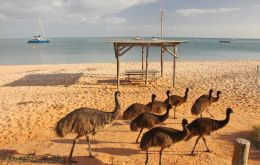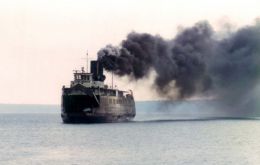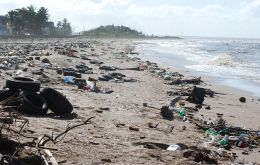MercoPress. South Atlantic News Agency
Tag: Eviroment
-
Tuesday, August 21st 2018 - 08:04 UTC
Emus flock to towns as Australia continues to struggle with extreme drought

Large numbers of emus have been flocking to an outback mining town in New South Wales as Australia continues to struggle with extreme drought. The flightless birds are desperately searching for food and water in Broken Hill, local animal rescue services say.
-
Wednesday, May 30th 2018 - 08:35 UTC
Shipping emissions the greatest challenge to oil price hikes

The most prominent driver of oil prices over the next two years is not likely to come from OPEC, Iran or Venezuela, but rather in the shape of a shipping revolution, analysts have warned. New rules coming into force in approximately 18 months' time are seen as a source of great concern for some of the world's biggest oil producers.
-
Tuesday, April 10th 2018 - 09:02 UTC
Plastic crisis: divert foreign aid to dumpsites in developing countries

By Christine Cole (*) - Plastic pollution in the oceans is a major problem that is finally getting the attention it deserves, thanks to Blue Plan II. It makes headline news almost every week – and famous figures such as the Pope, Prince Charles, Dame Ellen MacArthur and Sir David Attenborough have all joined the debate.
-
Monday, January 29th 2018 - 10:22 UTC
Ozone hole: NASA's satellite confirms 20% less depletion; recovery by 2080

Scientists have shown through direct satellite observations of the ozone hole that levels of ozone-destroying chlorine are declining. Measurements show that the decline in chlorine, resulting from an international ban on chlorine-containing man-made chemicals called chlorofluorocarbons (CFCs), has resulted in about 20% less ozone depletion during the Antarctic winter than there was in 2005, the first year that measurements of chlorine and ozone during the Antarctic winter were made by NASA's Aura satellite.
-
Wednesday, January 10th 2018 - 10:33 UTC
Scorched Australia: 2017 third hottest year on record

Australia experienced its third-warmest year on record in 2017, according to the nation's Bureau of Meteorology. The national mean temperature of 22.75C was almost 1C higher than a 1961-1990 baseline, its annual report revealed. Only 2005 and 2013 were warmer, based on records kept for about a century.
